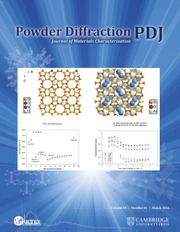Article contents
Developing a method for the evaluation of dislocation parameters from the Rietveld refinement procedure
Published online by Cambridge University Press: 10 June 2016
Abstract
In this investigation, the ability of Rietveld refinement method was used to simultaneously refine the structure and microstructure and evaluate the linear defects of cubic crystals. To do this, the basis of Stephans theory, about the anisotropic strain broadening, was developed and the values of dislocation density as well as the fraction of dislocation types were estimated. The reliability of this procedure was checked by selecting four different nanocrystaslline samples and evaluating the microstructure of these materials. Finally, the results were compared with those extracted from the whole powder pattern modeling method. Good agreement was achieved between the results of two methods.
Information
- Type
- Technical Articles
- Information
- Copyright
- Copyright © International Centre for Diffraction Data 2016
References
- 6
- Cited by


